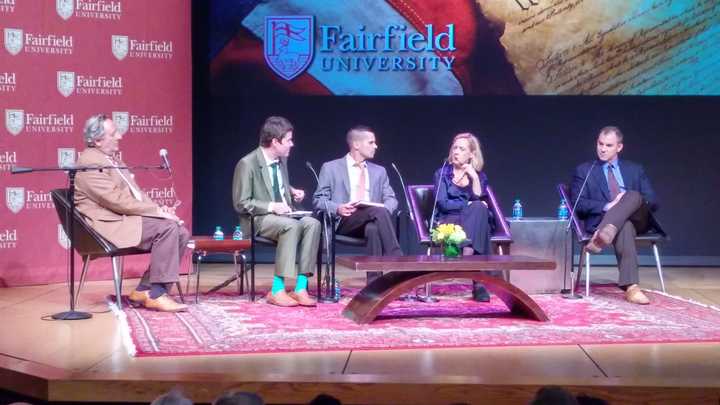“I think we are living in a very interesting moment,” said Frank Bruni, a New York Times Op-Ed columnist and former film critic.
While the Internet may have made society more connected, to each other and to information, than ever before, Bruni believes it has lead us to live in “a gazillion digital villages,” which act more like “information silos.”
“Today, America is becoming more partisan than ever before,” Bruni told a crowd of almost 600 people at Fairfield University’s Regina A. Quick Center for the Arts, on Thursday night.
This trend toward narrow-mindedness and away from bipartisan politics, he said, lies deeply in the Internet’s information sharing ability.
“Instead of using our social media to connect with people all over the world,” said Bruni, “we use it to endlessly connect to like-minded people.”
Bruni and colleague Alessandra Stanley, the New York Times chief television critic, spoke at the Open VISIONS Forum. The event, “Reflections On Media and Culture in America Today,” was also filmed by C-SPAN, to air at a later date.
Although Stanley mostly agreed with Bruni, but as a television critic and lover of the media platform, her views tended to be more optimistic.
“Our world is getting more narrow,” Stanley said during a q-and-a. “But, some people are being taken to places they could never be before,” by services such as Netflix, which brings consumers media from all corners of the planet.
To that effect, entertainment has also taken on a role of informing the public on issues such as historical events that may get lost in the distractions of Twitter feeds and group chats. Stanley recounted a time where her young niece was able to tell Stanley about Kristallnacht, because she had learned it from the Disney movie, “The Princess Diaries.”
“People are learning things from things you wouldn’t expect,” Stanley said.
For Bruni, however, the answer to the problem of narrow-mindedness doesn’t lie in more media, necessarily, but rather different kinds of media.
“My biggest advice to students,” said Bruni, “is to follow a couple people, or read from websites, who don’t think as you do.”
Click here to follow Daily Voice Fairfield and receive free news updates.


